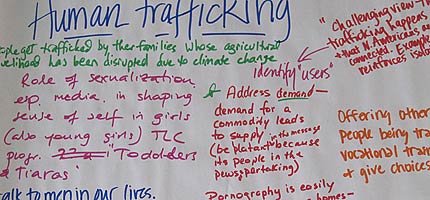© Mikka McCracken
01.02.2010
Women Delegates Urge Lutheran Communion to Address Human Trafficking Issues
Just to Put Food on the Table
KITCHENER, Ontario, Canada/GENEVA, 1 February 2010 (LWI) - Women’s issues should not be just a priority for women throughout the Lutheran World Federation (LWF); being an inclusive communion is the responsibility of the entire communion.
Speaking on behalf of women delegates and advisers attending the LWF North America Pre-Assembly Consultation (NAPAC), Mikka McCracken, female youth delegate from the Evangelical Lutheran Church in America (ELCA) urged all LWF North American delegates to take on the issues women delegates have lifted up as priorities within the whole LWF.
“These are issues that we are all called to,” said McCracken. “If only women take them on, this is not full communion.”
Participants were urged to stand in solidarity with women delegates in addressing the issues of human trafficking, women in leadership and food justice. The three priority areas were first prepared and proclaimed at the LWF Women’s Pre-Assembly in Bogis-Bossey, Switzerland, 27-31 October 2009, and were affirmed by North American region women delegates.
Twelve individuals in a variety of roles participated in the NAPAC youth and women’s meetings, which took place one day prior to the 29-31 January regional pre-assembly.
Education was a significant component in the call to address issues around human trafficking. “We have a lot of learning to do about what trafficking really is,” said McCracken. “This is not just something that happens elsewhere. It is the reality within our own context.”
Women delegates joined the LWF Council 2009 decision in absolutely rejecting “the turning of human beings into commodities, especially for the purposes of forced or exploitative labor, sexual exploitation, forced marriage, armed conflict or ‘organ harvesting.’” They called for wholeness for victims and recognition of commodification of human beings as sin.
Harmful Stigmas and Perceptions
“In some places women sell themselves just to put food on the table for their families,” noted McCracken. “The Church must combat the sale of women’s and children’s bodies, particularly at this time of global financial crisis.”
Within the North American context, delegates were urged to explore their responsibility for human trafficking by addressing some of the contributing factors such as increased availability and acceptability of pornography. “These are often considered to be sending countries and destination countries,” noted McCracken, in reference to both pornography and human trafficking. North America is often referred to as a destination country and its contribution to facilitating the demand of humans as commodities needs to be addressed. Delegates were encouraged to address the role they can have in changing the harmful stigmas and perceptions that women and children are dispensable and saleable.
Delegates were also urged to play a greater role in affirming women in leadership throughout the church. Women delegates strongly affirmed the LWF’s commitment to women’s ordination, first made by the 1984 Assembly in Budapest, Hungary. “We, men and women, must raise up and nurture women and know where power and privilege are at work,” said McCracken.
LWF member churches were encouraged to identify processes for naming female candidates to key LWF positions, and create opportunities to see visible change in the Lutheran family, including addressing issues around appropriate legislation and regulations that would enable women to take positions of leadership. The women delegates called for the creation of an LWF task force to organize theological discussions to identify guiding gender justice principles that would help member churches to contextualize and promote gender policies.
“We recognize the importance of modeling,” said McCracken, referring to the North American context, “and we encourage churches worldwide to experience women in the pulpit, at the altar, and in decision-making bodies.”
Turning to the issue of food justice, the changing dynamics within North American households were discussed. McCracken noted a recent statistic indicating that within the United States, 22 percent of women earn more than their husbands and are considered, “the bread winners” in their households. In addition, food production has become more industrialized; farmland is being converted to development and housing and profit is the primary motivator versus nutrition, she said.
McCracken called on delegates to consider that “when we pray, we acknowledge that food is a gift from God.” LWF churches were encouraged to actively participate in the fight for food justice through engagement in campaigns and the search for long-term sustainable change in this area. (725 words)
Journey | North America Pre-Assembly Consultation

